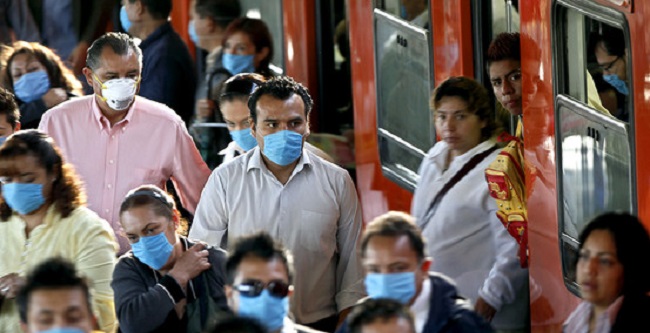Most countries not prepared for a pandemic
Posted by admin on Wednesday, May 31, 2017 · Leave a Comment

photo: sites.google.com
Despite progress made since the Zika and Ebola crises, a report released today by the International Working Group on Financing Preparedness (IWG), established by the World Bank, shows that most countries are not adequately prepared for a pandemic, and the world is still doing too little to finance recommended actions to strengthen pandemic preparedness.
The report, entitled From Panic and Neglect to Investing in Health Security: Financing Pandemic Preparedness at a National Level, lays out 12 recommendations to ensure the adequate financing of the capabilities and infrastructure required to prevent, identify, contain, and respond to infectious disease outbreaks.
Many countries chronically underinvest in critical public health functions like disease surveillance, diagnostic laboratories, and emergency operations centers, which enable the early identification and containment of outbreaks.
So far, 37 countries have completed the rigorous peer-reviewed assessments, called the Joint External Evaluation (JEE), of their preparedness capacities to identify their gaps and needs. But that leaves 162 countries that have not.
Moreover, only two of the countries that have completed this assessment have used the results to devise costed plans. The report urges national governments to prioritize financing preparedness in their domestic budgets, as should international donors.
Not investing enough in pandemic preparedness puts lives at risk and is bad economics. A severe pandemic could result in millions of deaths and cost trillions of dollars, and even smaller outbreaks can cost thousands of lives and cause immense economic damage.
The most conservative estimates suggest that pandemics destroy 0.1 to 1.0 percent of global GDP, on par with other global threats such as climate change. Recent economic work suggests that the annual global cost of moderately severe to severe pandemics is roughly $570 billion, or 0.7 percent of global income.
“Preparedness at a national level is the first line of defense against pandemic threats, and thus the foundation of universal health security. Yet we have underinvested in the capabilities and infrastructure essential for preparedness,” said Peter Sands, former CEO of Standard Chartered Bank, who is Chair of the IWG and now a Senior Fellow at Harvard University. “Given the scale of risk to human lives and livelihoods, the investment case for financing preparedness is compelling. We must make it happen.”
Pandemic preparedness prevents, detects, and responds to the spread of disease both in humans and in livestock that have close contact with humans.
The last 30 years have seen a steady increase in the frequency and diversity of disease outbreaks. Just in the last few weeks, for example, Ebola has resurfaced in the Democratic Republic of the Congo (DRC) for the eighth time, with four possible deaths and 43 possible cases identified as of May 23. Importantly, DRC has had a strong track record of containing previous outbreaks.
“Pandemics can strike anywhere, and everyone is at risk – especially the poor and the vulnerable,” World Bank Group President Jim Yong Kim said. “We must finally break the cycle of panic and neglect in our response to grave threats from infectious diseases. We have to ensure we are prepared, so the next outbreak does not become the next pandemic.”
Failing to invest in preparedness is especially short-sighted given the low cost of preparedness relative to the devastating impact of a pandemic. In low- and middle-income countries that have calculated the cost of financing preparedness, the investment required is about $1 per person per year.
“Countries and international development partners all need to recognize the seriousness of pandemics and do their part to pay for preparedness,” said Recep Akdağ, Minister of Health of the Republic of Turkey. “If we don’t do this now, we will find ourselves losing decades of health and economic gains when we are hit with an infectious disease outbreak.”
The IWG, established in November 2016, puts forward 12 far-reaching recommendations, including getting all national governments to commit to conducting assessment of preparedness and animal health capacities by the end of 2019; ensuring the results of these assessments are translated into costed action plans, supported by financing proposals and investment cases; reinforcing tax resources, including earmarked taxes, to finance preparedness; ensuring donors fulfill their commitments, focusing development assistance on large one-off capital expenses that countries cannot afford, on regional initiatives and on fragile states; and ensuring the economic risks of infectious diseases are factored into macroeconomic assessments and investment decision-making, like other systemic risks are.
“Outbreak preparedness is chronically under-funded, and we have been waiting for bold thinking on financing since at least the mid-nineties,” said Margaret Chan, Director-General of the World Health Organization (WHO). “Implementing the IWG recommendations will ensure that every country mobilizes the resources necessary to prevent, detect, and respond to future outbreaks.”
The ultimate goal of robust pandemic preparedness is universal health security, which means protecting all people from threats to their health.
Universal health security is an essential component of universal health coverage–where everyone can obtain the quality health services they need, while not being pushed into poverty by having to pay out-of-pocket for health care costs.
Universal health security contributes to and depends on stronger and more resilient health systems, and is critical to achievement of the sustainable development goals.
World Bank


